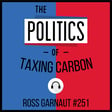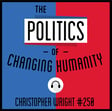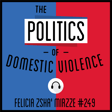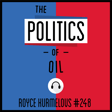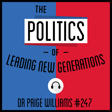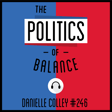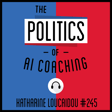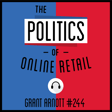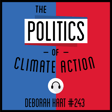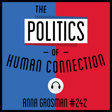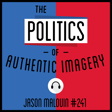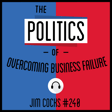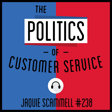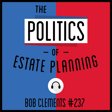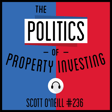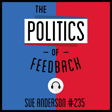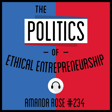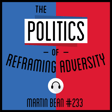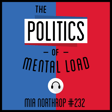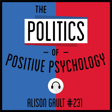Become a Creator today!Start creating today - Share your story with the world!
Start for free
00:00:00
00:00:01

239: The Politics of Expertise - Hayley Osborne
Everyone has something they are good at right? Many years ago, my then business coach said I could turn my expertise into a business as long as I could also make money from it and have passion for what I did. Being an expert looks easy but how do you become the ‘go-to’ expert for your sector and ensure you land the right clients or customers easier? My guest today Hayley Osborne helps other businesspeople more high-quality leads and inquiries into their business. She is a keynote speaker, creator of the Superhero Marketing Membership, host of podcast, The Hayley Osborne Show, and has been featured in major publications and radio. She works one-on-one with her high-achieving clients and brands as their trusted advisor. Her online coaching community, the Superhero Marketing Membership helps you get clear on what marketing strategies and activities you need to do, giving you the biggest growth, with the least amount of time and effort for your business. This all sounds like stuff we need!
In this show learn from Hayley on:
· Is that something we can all do if we follow your approach or is it certain types of businesses you work with?
Small business marketing is usually hamstrung by money and time constraints – how can we know what to prioritise and when so we can get a great sense of achievement in what we do?
How can marketing success become an ongoing theme vs a burst of success than a flat period?
Is a mailing list all we need to create that funnel of leads and wins in SMEs or is there a wider approach we need?
Connect further:
(4) Hayley Osborne | LinkedIn
www.hayleyosborne.com
POE listener offer: Zencastr is my podcast platform of choice. Use my special link (zen.ai/thepoliticsofeverything30 [http://zen.ai/thepoliticsofeverything30]) and use code "THEPOLITICSOFEVERYTHING" to save 30% off your first three months of Zencastr professional. #madeonzencastr
Transcript
Introduction to 'The Politics of Everything'
00:00:02
Speaker
Welcome to the politics of everything. I'm Amber Danes, your host and podcast producer. This is a half hour of power podcast dropping every week where I unpack the politics of everything from money to motherhood, nutrition to narcissism, startups to secularism, the environment, quality and much, much more.
Nonpartisan Podcast Overview
00:00:22
Speaker
Our guests are seasoned in the field of topic of their choice, even if you've not heard of them yet. This is a nonpartisan show. So while I love exploring varied views and get a buzz from a healthy debate of ideas, this is not a purely blue, white, green program. Please subscribe, tune in and enjoy the politics of everything.
Business Advice for Passion Projects
00:00:46
Speaker
Everyone has something they're good at, right? Many years ago, my then business coach said that I could turn my expertise into a business if I could also make money from it, but also have a passion for what I did. Being an expert from the outside can look easy, but how do you become that go-to expert for your industry or sector and ensure you land the right clients or customers easily?
Hayley Osborne's Marketing Expertise
00:01:07
Speaker
My guest today, Hayley Osborne, helps other business people to create more high quality leads and inquiries into their business.
00:01:13
Speaker
She's a keynote speaker, creator of the Superhero Marketing Membership, host of a podcast called The Haley Osborne Show, and has been featured in major publications and radio. She works one-on-one with high-achieving clients and brands as their trusted advisor. And her online coaching community, the Superhero Marketing Membership, helps you get clear on what marketing strategies and activities you need to do, giving you the best growth with the least amount of time and effort for your business. It does sound like magic.
00:01:39
Speaker
This sounds like something we all probably need in our businesses, and I warmly welcome her to the politics of everything. Hi, how are you? That was such a good intro.
Podcast Production with Zencastr
00:01:49
Speaker
Good. What casting remotely can be challenging, but it doesn't have to be. Since day one of the politics of everything, I have relied on Zincasters all in one solution to make the process quick and painless, the way it should be for those of us who just love great content and want to get our ideas out into the world.
00:02:05
Speaker
If you know me, I'm obsessed with quality in terms of my guests, my sound, and everything about my show has to be great the first time. I'm Time Paul. It's so easy to use Zencaster. I'm not tech savvy and you don't need to be either. There's nothing to download. Just click on the link and off we go. Zencaster is all about making your podcasting experience easy and with everything from local recording to automate post-productions now in their toolkit,
00:02:31
Speaker
You don't have to leave your browser to get that episode done and done fast. I have a special offer for you and I hopefully you can experience what I have with Zencaster. Go to zencaster dot.com forward slash pricing and use my VIP code, the politics of everything, all lowercase in one word.
00:02:49
Speaker
to get 30% off your first three months of Zcaster Professional. How good is that? I want you to have the same easy experiences I do for all my podcasting and content needs. It's time to share your story.
Hayley's Fashion Journey
00:03:02
Speaker
oh It's such a great topic and something which I think I've just assumed because I've been doing my thing for so long that other people would already know this stuff but obviously you have a business which helps people find their expertise but I am going to start by asking you what you thought you do as a kid and whether you know this was something that if we join the dots we'd go yep that's why Hailey does what she does today or is it completely different?
00:03:24
Speaker
Yeah so look I was always really into fashion as a kid so in my heart of hearts I really wanted to be a fashion designer I saw that as like my thing and then I was like oh I don't know if you can really make money from that and then I was always really creative so I was like the creative type English sort of was I was really good at as a kid and not really the mathematical sort of person. So I'm not surprised that I did land where I am. So I did actually have a hand at fashion. I wasn't going to let it go. um I've been a go getter since like forever. So I've had three businesses.
00:04:04
Speaker
And one of them was a fashion label. Oh, there you go. What happened with that? Did you sell it? Did you just wind it up? Like how did that land? Yes, so I did. So I started just making, I could always sew and I taught myself. And then I started making things for me to wear out on a Saturday night, like when I was younger and girls would ask in the toilet, where did you get that? And I was like, oh, oh, this could be a thing. And so I started making them for other people. And then I had a market stall ah they sold out. And so I made more and I had another market stall they sold out. And then it was approached for from a few shops.
00:04:43
Speaker
to stock my label, I still didn't have any formal qualifications at all. Just winging it along. you know i just No idea how to run a business. ah And then i was i then I was like, right, well, if this is going to be a thing, I need to get some formal qualifications. So I did do that. And then I was nominated for Emerging Designer of the Year. And I manufactured in China. I had national stockers. And then the whole industry I didn't love and it was very fickle it was just I don't the people it just wasn't my vibe and so I couldn't continue like my creative genius at the speed that they wanted so you had to design a collection like
00:05:27
Speaker
more than six months in advance of it coming out even and I just I didn't like that I liked to be able to be creative like on the spot so I was like this isn't for me and then the business thing like this was I would have been early 20s and that really threw me too so I shut the whole thing down even though I was getting good street cred and everything and this was before Instagram started Sorry. Wow. I like that though. So you did, I mean, it sounds like you pursue your passions and find things and give them a good, good red hot go, which is I guess what business people do.
Transition to Marketing and Side Ventures
00:06:02
Speaker
Yeah. So the fashion thing, like I still do some sewing, but just for myself.
00:06:07
Speaker
ah and not not a lot because I have ah heaps of other things to do but that kind of has always been a passion of mine. I love fashion and that's kind of where it started so that's what I kind of grew up thinking that I would do I think. I never really thought about it though I just kind of followed the bouncing ball and then yeah yeah I hope that answers your question. Yeah totally and so how long have you had your current business for?
00:06:30
Speaker
Six years. So I ah have a marketing background, I have a marketing degree. I worked on some of the biggest alcohol brands in the world in Sydney. And that was pretty much the transition from the fashion label to think, OK, so I really need to use my but qualifications for good now. So I went and got a job ah and I was there for five years. And I started off, you know, the year that Instagram started, that was when I created some of the biggest brand pages in Australia Jack Daniels Southern Comfort like lots of big alcohol brands and then I worked my way through in marketing ah and then I moved back to Adelaide and I thought okay so this is great so there's not a lot of wasn't at the time a lot of head offices here so I
00:07:20
Speaker
got a job for the lead agency for foreign direct investment into the
Generating Leads and Online Presence
00:07:24
Speaker
state. And that was in a marketing capacity, but it really worked on my analytical love. And so it was a lot of writing, a lot of different type of creativity, right? So you're dealing with government ministers, like state stuff, important, lots of money, things, and less creative.
00:07:41
Speaker
So with that, I started a candle business on the side. I just couldn't stop in business. And so then I wasn't just a candle business. I had beautiful packaging around that. It's still around. It's called Haley Kate. ah The label, the website is there.
00:07:58
Speaker
I don't market it I don't do anything with it when online orders come in I feel them that's it because I do have a young family and so the candle business went really well and then I would attend trade fairs in my holidays so mind you I still wasn't married I didn't have kids while doing all this I was just like hustling hard trying to figure it out right I think that's what you do when you're younger You got more hours in the day, that's for sure. And then when I was at, I would go to Melbourne and Sydney for different trade fairs. Again, I got lots of different stockists all over Australia for my candles. And at trade fairs, you are there for five days and you are ah next to the same business owners for that long. And so, you know, the conversations happened, what do you do during the day, blah, blah, blah. And I would always say, I'm in marketing.
00:08:44
Speaker
And then I basically got four or five international marketing clients from the trade fairs that I went to without having a business. That's amazing. That's amazing. So then you first engineer it, you had got the clients and then got a business. A lot of people start a business and go, hey, what am I going to do now? Which leads me into my next question. What's the best way to create these kind of business leads? And of course, we don't need all your secret sauce. That's what people pay you for. But That's a great example of what you did, which maybe worked at the time, but I guess now things are far more online. People don't necessarily even go to trade fairs as much anymore, for example. So you'd have to do it differently. Is there is it kind of like that the most common way or the most prolific way you find works for people?
00:09:31
Speaker
Yeah, so that was just like a one off. That's not something that I would just do to go harvest business. It was just because I was there because I was there. And then it was like, oh, this could be a thing. Quit your job and go all in while you still don't have any attachment. So I did that. And so then I think the best way to create leads. Well, there's a couple of ways is number one,
00:09:55
Speaker
do a lot of networking because the more people you talk to, the more people ah
Social Media Strategy for Growth
00:10:00
Speaker
can recommend you. And if it's not who's in the room, it's who's outside of the room that could possibly be your clients. And, you know, connecting in that way, I think events are a wonderful place for that.
00:10:12
Speaker
And then I think having a really great place for people to land. So as a consumer you would know, like you would Google anyone before you wanted to work with them or stalk them or buy from them their product or service or whatever. So having a really good place for people to land is not a like a kind of thing you need to have. It's a necessity that you need to have in this day and age because digital is moving so fast. So if you don't have somewhere for someone to stalk you, that's a big problem. And that kind of my brain's already going. That's part of that, that journey, if you like, the old customer journey that we often talk about that people will often watch, listen, consume before they've even engaged or bought from you. Is that still the case? Oh, absolutely. So you have to have somewhere for people to learn and
00:11:05
Speaker
you know if it's a simple as a one-pager then that's fine but build on that but it's not the only way so you know social media is free and it is the most powerful marketing tool the world has ever seen but you need to know how to use it for good and not evil you need to know how to strategically use it well and you know gone are the days of having the most polished space on the internet people want real people want to be talked with not talked at and You just need to keep it kind of conversational and it's the storytelling around your thought leadership as a business that will be the thing that creates a level of income for you and New leads that is where it's at. It's not selling. Nobody sells on these platforms anymore it is storytelling and you've got to do a great job because you need to build a that trust, that no like and trust factor. oh So that leads me to ask you, is there certain types of businesses that you particularly work with, your kind of, I guess, your sweet spot, if you like, that follow this approach? But is there things that then they have to build on? Because I do know from personal experience, you can spend a lot of time producing content and you've done all the research, you've got a strategy, you've got your content calendar, you know your ideal audience. It doesn't necessarily mean it's going to have engagement.
00:12:24
Speaker
Yeah, so predominantly I, well, what's been drawn to me, I think just through my years of experience is service-based businesses. So I don't tend to work with product-based businesses. That's just not. So no candles for you. No, no candles. But they know bothers if they come in though,
00:12:43
Speaker
I have some solid experience because I have run a business like that, but more service based businesses. And so it does become then a layer like harder and trickier to market because you don't have a physical product. You have a, you know, digital product or whatever it looks like. So you do have to get really good at storytelling. And so I found that the one thing that sets businesses apart from, you know, everyone else is consistency because when you are, you know, you're not marketing your business when you're busy, are you? You're holding back and you're working in your business, you're servicing your clients. And then you're like, oh my God, the tapas dry. I need to market my business. It doesn't work like that. So the most success that I've seen are those that are consistent in their approach. And I'm not just talking about social media. I'm talking about all the things through the line.
00:13:37
Speaker
And that might be things like, you know, guest speaking, being in webinars, co-partnering with people, yeah other sort of, I guess, marketing activities, which are not just online, but offline. Yeah. And don't forget, too, that social media is a rented space.
00:13:52
Speaker
So we don't own that. you know We've all seen when Instagram goes down, the world has a hissy fit. But if you've been building your database, which is your own asset, you own that, it's not rented, then you have a warm audience of people that you can communicate to. And essentially the next time you go to launch something, you've got a new product or service, it should sell out based on your beautiful email list that you've been building.
Top-of-Funnel Activities for Small Businesses
00:14:17
Speaker
Essentially. Yeah, that's the theory. Obviously, small businesses, and I'm one of them as well, in our marketing you know goals, we're usually hamstrung by two things, time and money. How do we know what to prioritize so that we can get that, I guess, the sense of achievement in the effort we're putting in, but make sure it's for the long term. like A lot of stuff, like you just talked about that knee-jerk reaction, the tap is dry, I need to like ramp up my LinkedIn posts and suddenly attract new clients. It's not necessarily going to work.
00:14:43
Speaker
because it's a slow burn and it's a long pipeline. What is it that you think that people can do to kind of triage their small business marketing? I love this and I do get this question a lot. So I always say the top of funnel activities are the most valuable and that is like the long long game too. But that means, what that means is you writing articles for media, you appearing as guests on podcasts,
00:15:10
Speaker
Basically, any way that you can be in front of an audience that is not your own and you are able to showcase your zone of genius is the best way to grow your business. So making sure then, and I say this with a lot of love, there is also no point in you doing these activities. If you have no funnel for these new people to come in,
00:15:34
Speaker
to see what you're all about so for example you know i'm a guest on your podcast today and i have my website for people to go to just to so look at what i do i have some free things on there that are really valuable that will help people and so then by doing that they are providing me with their name in the email and then the in my world.
00:15:57
Speaker
and They're only going to do that if they really like me and they really like and think that what I have is of value. and so there's you know Top of funnel is important as a small business and that's what I would be. That's what I prioritize every single Monday. I make sure that I have one thing and I call it like that needle moving activity.
00:16:19
Speaker
where i am reaching out to new audiences and that grows the business and then the rest follows. So that marketing success trajectory if you like to be an ongoing theme versus those bursts of success is that always the case though i imagine you know, people's products and services when they first launch sometimes can be, you know, make a big splash and then things peter
Consistent Business Growth Strategies
00:16:40
Speaker
out. and My perfect example would be my evergreen podcast creator course, which is, you know, when I first launched it, I had so many sales, I didn't have to do much. Now it's a year on and I feel like I could easily make no sales for that for like a month.
00:16:55
Speaker
because it's been in the market for a while. So how do you make sure that I guess you're not you know having that feast and famine thing, which I think some businesses expect, but it doesn't help your cashflow. Yeah. So you really need to allocate time to talk about these things. And when you're talking about them, that creates energy around whatever it is you're talking about, which then you know it creates awareness and people interested. So I liken that to the way that I open and close the doors to my membership superhero marketing so
00:17:26
Speaker
doors are opening on the 19th of March coming up. So I think this will be aired before, after then. But basically... How often do you do that though? Once a year? What's the scarcity I guess? Twice a year. So twice a year and I have a full schedule. So for the year, I know exactly when I'm launching and I'm really strategic about it. And I think that's taken practice as well. open I wasn't and close the always doors to like this and not my membership, around Superhero school holidays. Marketing.
00:17:53
Speaker
no No, family Christmas or like, yeah, absolutely, when people are away. It's interesting you talk about March, because obviously um we're both in the online um course creation world and and memberships and so forth. And I'm just saying, like, everyone seems to launch in March. I sometimes think maybe it doesn't need to be March, but I think you're right. It's about school holidays, Easter, other things that are happening in the world.
00:18:13
Speaker
Yeah. And then I feel January is definitely a no go because, you know, people are chilling out. They're just not in that mindset. And then February, kids go back to school. But then you need that time as a business to be able to plan and like, you know, ramp up. Yeah. Feel like you're ready to go in again. So it's March is the day I actually did have February planned in this year. And then I pushed it back because I was like, I'm not ready for that. But I think that to your original question, the way that you kind of attract more attention to something that might be evergreen is to talk more about it. So I use something in my business called a cash calendar and I set that up again at the beginning of the year where I talk about something for one month.
00:18:59
Speaker
So for January and February, well January for example, it would be just talking about marketing strategy. So that's something that's nice to do at the start of the year. So you've got a nice idea of where you're going to place your efforts and what you're going to say and you know all the things moving forward planning wise.
00:19:16
Speaker
And then February, everything I talk about, every touch point of mine. So my emails, my podcast, my social media, all roads lead to in February the membership. So that's the runway. And same as March until the doors open. And so then I've got a clear idea of exactly my objective for the month. And then that drives people to those things and it works.
Effective Marketing Strategy Alignment
00:19:42
Speaker
Yeah, absolutely. And then I guess then that once the you know i launch is obviously a huge thing and then you kind of once that the door shut, then there's obviously a little bit of breathing space and then obviously the implementation side of things. In terms of being an expert, which is our topic today, what would you say would be your expertise? What would be the thing that people would come to you for? like Because for example, things like you know marketing and small business marketing is very broad, but there is ah one thing that you're really known for, you want to be known for.
00:20:08
Speaker
Yeah, so look, it is marketing, but I'm really good at creating like the strategies and activities. Right. Yeah. I like that. Yeah. Yeah. So often people go with the strategy or they go to the activities, but they don't necessarily marry the both. Like there's not like you say, you weren't always strategic. I think a lot of people go into business and they're not necessarily strategic. I think that's really important because otherwise you're just I don't want to use the term, but you're just throwing spaghetti at the wall. Like you're just kind of all over the place. But when you have a clear plan and activities, the activity part is probably the one word that stands out that
00:20:45
Speaker
towards your question is the activities that you do are the things that are going to create the biggest growth. And you need to figure out what that is. So that's my superpower, I guess. Yeah, that's great. Because I think a lot of people and I've been in my own business, I've had multiple businesses as well in the past 16 years.
00:21:03
Speaker
But when you leave, for example, corporate or, you know, a career where you might have been a lawyer or whatever your label is, your job title, it's easy to go, but I can do lots of different things. And then when you go into a business, how do you refi... You kind of think everyone's your client. Like, I've done all this stuff, right? Where you just go, I do PR for everybody and this is my thing and this is what I love. And it's like, I don't actually love all that. And as time goes on, that all whittles away. But it does take you a while to work it out because your expertise isn't say you form a job title, right? It's something else. Yeah, that's right. Honestly, I would have changed my let's call it a transformation message probably about six times and ah this is six times in six years. Like, oh, yeah, like I've just I've just morphed and changed. So I originally my business name was called Social Soul.
00:21:53
Speaker
because I was really good at social media and managing clients and then I realized that's not something that I enjoy doing so much and so out like exceeded the capacity right so the one-on-one I get this I mean yeah you can't clone you right you can't it's not a scalable thing and I was like well this isn't gonna work and then I had a full-time staff member and I just I I was like, I don't want to turn into an agency. That's not what I want. And then so I looked at other ways to work that better suited me and my happiness and I guess what I considered to be a success. And so I do still have a bunch of clients that I look after.
00:22:31
Speaker
their whole marketing strategy. So these are high level clients. They are tech companies, allied health. They've got 10 to 15 staff. They don't want to employ someone like me full time. The CEO wants to say, here's the thing, go do it. Don't call me. So, but I only take on a small handful and I've become really selective what that looks like. And so, and I'm so happy with that. I love it so much.
00:22:57
Speaker
And then I've got my membership that sits on the other side that helps small businesses that can't afford to work with me one-on-one, but know that it's important that they keep their finger on the poles in this space. So I teach all of the things in there. And then i obviously I work one-on-one with clients who want fast growth and social media strategy and marketing strategy. so I found a beautiful sweet spot. So the thing- We're very similar in the way we've morphed into those kinds of businesses. I still have legacy, retainer clients and the corporate set my business, you know, I was a business journalist, so financial services clients and things like that. I still love them, but I don't want to scale that entirely. I want to have, like you say, like that, you know, the one-on-one coaching at a high level, but then also that kind of membership and online course world, which, you know, is the one-to-many model really.
00:23:46
Speaker
Yeah and I love the membership and so something that is happening this year is I am launching a short course so that's the one thing and I would love to write a book but it's not on the cards this year. Can't do all the things Hailey. You can't and so the short course is something that is missing from my model.
00:24:04
Speaker
And that may be evergreen, it may be live, but it's more around marketing foundations, not necessarily for startups and small businesses, but the amount of people that I speak to that have been in business for about five years and I say, do you have your marketing foundation sorted? Do you even know what they are? And they say no.
00:24:24
Speaker
And so yeah there's definitely a gap there and you could probably fill that and plug that in easily and scale that one too. Going
Building a Targeted Email List
00:24:32
Speaker
on to mailing lists, which we talked about a little bit earlier when you talked about people having those valuable ah digital assets, which they might download from your website or from anyone else's you know platform that create that that list. And I do hear about the list a lot. I have a significant list, but I think my thing is my list is a little bit um Schizophrenic is the word I'd use because I have corporate clients and I have small business and I don't just work with women. And there's, you know, there's so many like nuances to my list that sometimes it feels like the list is not everything for me and what I do. But is it really the best way to create those leads or is there a wider approach? And I do say that because a lot of people might subscribe to get the free thing and then unsubscribe because they're like got the thing they want and they don't want anything else from you because they'll never buy from you no matter how affordable your product or service is.
00:25:17
Speaker
Yeah, I think, look, I don't have the biggest list, but the list that I have, and ah it's a it's much like your list as well. I've got corporates, I've got small business. I don't even know some of the people that ah are on there to be honest, but it's not massive. And I think it's the right audience though for me.
00:25:34
Speaker
So I think that's great, but I do think that you need all the things. You can't have a business these days and not do everything, but you need to be smart about it. So it's about having that one piece, the way you nurture these people, like you need to send a consistent email.
00:25:53
Speaker
Otherwise, you know, people don't give their emails away for free these days and you would know you've signed up to a retailer and you get two emails a day for the rest of your life. I know, like offers reminder of the offer, the office closing or SMS. That's my worst where it's like beeping and it's like, I ah don't need to know that every hour. I'm not going shopping every hour.
00:26:14
Speaker
No. And so you've got to be really valuable in your approach because these people that sign up to hear from you, they want to hear from you. And when you don't send them information, it's like spamming in reverse. So I do think the email list is really important, but I do think all
Content Creation Approach
00:26:30
Speaker
the things are. So the way I work like from a top down approach for my content and probably you do as well. So I have a podcast um which you mentioned called the Haley Osborne show. That is my hero piece of content.
00:26:42
Speaker
Then that piece of audio gets transcribed and from that it creates a social post and my blog post. And then that also creates my email for the week, which then creates a series of other social media posts. And so I'm not like crazy all the things I say that and it's like, oh, I'm always creating content. I'm not because I'm being really smart about it.
00:27:06
Speaker
now not everyone has a podcast so i would start with a blog and that will really help with your seo you know it comes from exactly yeah that's important people forget about that i think sometimes we're focused on like what we're doing a podcast or you know stuff that's not necessarily written down Yeah, so the blog is one thing that you can do if you want to get started into having a bit more of a top down strategic approach. Every week you write a blog from that piece of one piece of hero content, it forms the rest. Email, social medias. So I mean, Facebook, LinkedIn, Twitter, Instagram.
00:27:42
Speaker
Yeah, all the things. ah oh Except for the book, which would have to be bigger than that. Just changing tack a little bit. What's your favorite business tool at the
Favorite Business Tools and Apps
00:27:50
Speaker
moment? And what's it helping you do? And it doesn't even have to be businessy. I've had people share their like mindfulness app, for example. Yeah. Well, I will say I do love Canva. I know it probably sounds a bit cliche, but I love Canva. I use it for everything in my business. It saves me money and time.
00:28:06
Speaker
i've learned amazing hacks on what to do. I was going to say, do you do your own Canva or do you? Everything. Yeah, everything. I do everything. I love it. And that like ignites my creativity. Yeah, you like it. Yeah. yeah it's It's the new candle. Yeah, that's it. Canva is the new candle. I will say something really out of the blue though. This isn't a business tool. It's an app that I've recently discovered and you might have it. It's called Yucca. So Y-U-K-A.
00:28:35
Speaker
And I'm always like into the latest things and that's something I share in the membership. But it basically, I really, a huge value of mine as well on top of education is health. So I do believe I try and keep really fit and healthy and I believe there's a correlation with you know mindset and positive endorphins and all those things to make you a better business person. like You can think clearer and make better decisions. Totally. I couldn't start my day without exercise. I get up at a crazier clock because I'm not a night person. Yeah, me too. Then the days that I don't, I really miss it.
00:29:10
Speaker
Yeah. And so I think when you're healthy from the inside and out, I think that what I am better at running my business. And so one thing that I've started using is this app called Yucca and it's a scanning tool. So if you want to be healthy, really, really healthy from cosmetics to food, you can scan every barcode and it will tell you if it's good or not. Basically, it'll give it a score out of zero to 100.
00:29:38
Speaker
like red or like green. So from your body wash to your skincare products to the organic chips you buy your kids that ah that you think are good. Because they're in their healthy food aisle or something, you know. like Yeah. So this app is something that is a new discovery that I absolutely love that I think is good for business owners and anyone in general wanting to perform at a more optimal level when you, you know, like I just recently switched out my deodorant because of this app.
00:30:09
Speaker
And I'm like, I'm a smart, educated woman. Like, why did I think of this sooner? You know, yeah it's a great idea. I love that. yeah We'll have to get on that and have a look. What's been your biggest life lesson to date and what's it taught you?
Task Completion vs. Perfection
00:30:21
Speaker
Oh, done is better than perfect. I love that. I think that's something someone said to me really early on when I had my I had a big agency um just over a decade ago that I sold. And yeah, it was that whole thing of like, how do we get this ready for sale? And it just like,
00:30:36
Speaker
It just didn't have to all be ducks in a row, but I think I thought it did. So that was a big lesson for me, just taking the right offer at the right time with the right partner rather than going, yeah, I've got to have everything perfect and I've got to keep going until I can't go anymore. So, yeah, I love that.
Defining Success
00:30:51
Speaker
And how do you define your version of success? Freedom. time Time. Time is money. Time is freedom. Yeah, I think my version of success is starting the day when I want Finishing the day when I want not having to answer to anyone. I think that's definitely it. Obviously, you know, the financial rewards are a byproduct of that, but the ultimate version of success is freedom. And a final takeaway message for everyone on the politics of expertise.
00:31:23
Speaker
Well, education is power, right? So the more you read and upskill yourself with things that you don't know, I think that's really powerful because then you have more choices. And then again, like the done is better than perfect op yeah all day long.
00:31:39
Speaker
thats That's the tagline for this show, I think. Thank you so much, Hayley. It has been a fantastic conversation. A lot of rich information there and activities for people to kind of action, which I really love in our conversation. So thanks for your time and until next time, do take care.
00:32:12
Speaker
you or someone you know has a fresh
